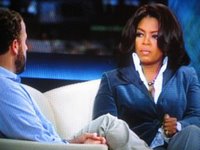Anomie and the cult of expertise: Oprah, Dr. Phil, and self-help infotainment
 In various periods of uneven or nonexistent employment, I've had the opportunity to sample some of the overripe fruits of major network daytime TV--enough to get a bellyache, not quite so much as to induce reflux. But damned if during the viewing I couldn't turn off the expensive PhD-level training. (Save some for the job market, duh.) Consider this media criticism after a pretty lazy fashion.
In various periods of uneven or nonexistent employment, I've had the opportunity to sample some of the overripe fruits of major network daytime TV--enough to get a bellyache, not quite so much as to induce reflux. But damned if during the viewing I couldn't turn off the expensive PhD-level training. (Save some for the job market, duh.) Consider this media criticism after a pretty lazy fashion.I fancied that I could discern some type of pattern in the endless parade of guests and variations on a limited set of themes. The basic question is: What are Oprah and Dr. Phil and their ilk up to? Bringing all these people into our living rooms to divulge "shocking secrets" or take their lumps from an invited know-it-all?
It's helpful to distinguish between the ends they think they're serving and the subtexts they in fact convey--"manifest" v. "latent" functions, perhaps. Oprah in particular plays up the educative or transformative value of what verges on exploitation. "You're helping millions of women by sharing your story" is a common refrain to tear-streaked guests, even when their appearance is only distinguished in degree from a Jerry Springer freak-a-thon and tongue-lashing.
It's also helpful to realize that the picture we're sketching actually extends to a bigger programming segment, one that contains shows like Supernanny and What Not To Wear, and is also constituted by the huge and ever-growing market for self-help media.
What do all these phenomena have in common?
The assumption (or construction) of a population of people who cry out for guidance because the old rules don't work and the new rules are unclear, nonexistent, or off-putting.
Hmmm, this sounds like a job for social theory! Specifically, Durkheim's concept of anomie: a-nomos, "without laws." (Almost makes the $30K in loans worthwhile.)
Yes, anomie--the individual-level experience of the breakdown of a more coherent social order/worldview into multiple self-sustaining lifeworlds, with no clear or compelling criteria to take one and run with it, but the persistent push to choose or lose. Such freedom could be liberating if it weren't for the incommensurability (yet more theory, this time Kuhn's "Structure of Scientific Revolutions") between the thought styles of those lifeworlds.
Not like I have any easy answers for people who may be seeking grounding and meaning on a TV soundstage. However, before you let Dr. Phil spit therapeutic invective and barbecue sauce fumes at you on the air, consider the following big-picture factors that just might have some impact on you:
We are collectivized/massified by the media, the state, various service industries, etc., while at the same time we're individualized/atomized by the proliferating choices and technology of late modernity. Is there perhaps a bit of - economic and social-psychological - alienation going on, as well? A disconnection from our institutions and our fellow humans? You bet your expanding ass there is. On top of all this, the explosion in knowledge of the last several centuries has necessitated an exploding number of experts--making more and more of us nonexperts.
Enough theory. I simply wish to point out, to potential talk show guests seeking guidance:
- this is way bigger than you and me and Oprah;
- there is another way to make some sense out of it;
- there is no reason to believe expert pronouncements simply because they come from experts by way of your TV.


0 Comments:
Post a Comment
<< Home